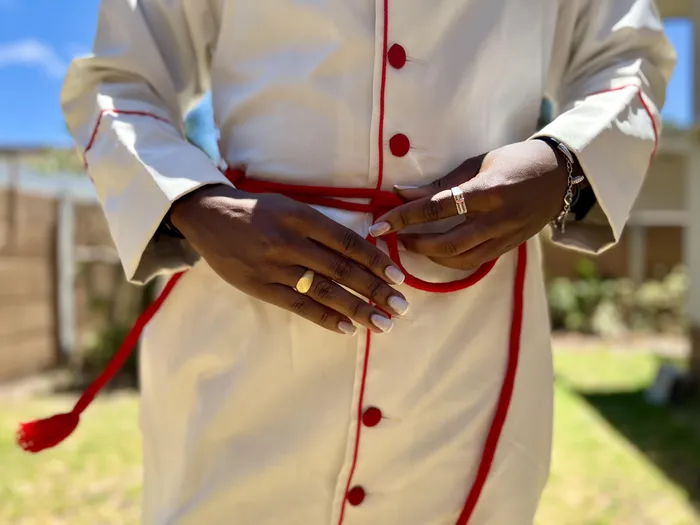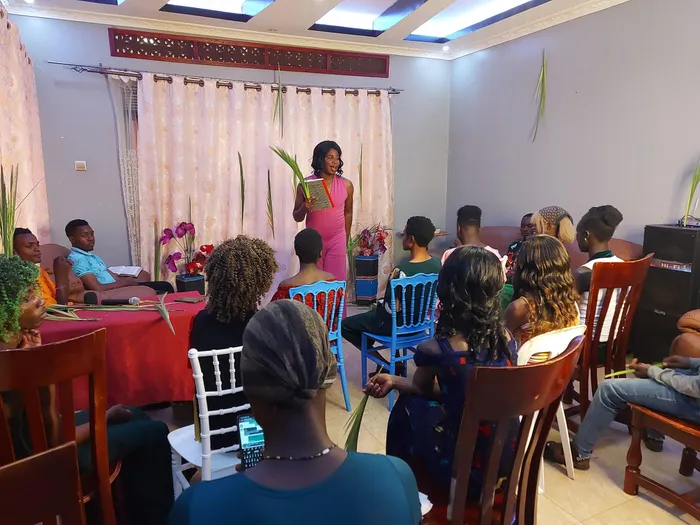Fleeing from hate: Ugandan transgender religious leaders, and their search for home

After a days-long journey (which she describes as “another hell”), Barney is now living in South Africa – a life which comes with its own set of challenges.
Image: Carl Collison
Maama Annet’s soft-spoken voice belies a steely determination. Over a patchy WhatsApp call, the 33-year-old is barely audible as she says: “We are all created in God’s image. No matter our gender identity or sexuality. So, my calling as a trans woman pastor is to address all of the heterosex(ist) Bible theories and teachings to make the world understand that everyone has the right and freedom to religion.”

AggieUganda: Dennet-Harmon addressing TAYCOF’s LGBTIQA+ parishioners, during one of the church’s weekly services.
Image: Supplied
In 2020, along with two other transgender Ugandan women (Aggie Dennett-Harmon and Deron Sheri), Annet established Talented Youth Community Fellowship Uganda (TAYCOF), a Kampala-based, in-person, “interfaith and ecumenical” ministry for LGBTIQA+ Ugandans.
“I came up with the idea of starting (an) LGBTI church because we queer people are being discriminated (against)…by religious leaders and in all religious spaces in Uganda,” says Annet.
Twenty-two-year-old Dennett-Harmon says the discrimination the trio faced came from all sectors. From within the queer community, they were told they are “no good” and “only care about looks (and) men.”
From the broader society, they were told they are “just agents of the devil. That we're trying to erase people's minds; trying to give them a different perspective of what Christianity is. That we are shaming God. (And that we are) pretending to be like Christians…They basically said we're trying to cover our sin of being trans in Christianity.”
This pervasive derision did nothing to deter them. Their continued work saw the ministry grow in popularity. In 2020, when they first established the church, there were around 25 members. “But,” says Annet, “it was growing, growing. Many people were interested in coming to fellowship with us. Sometimes there were 100 people who came for service.” On average, though, every Sunday saw approximately 50 people attending their services.
In addition to the church, TAYCOF offered a range of services: a shelter for homeless trans women (and other queer persons), mental health support, Bible study classes, sports, HIV testing, and referrals for medical treatments. There were plans for even more activities, but a lack of finances and a political blow put an end to those dreams.
In March 2023, the Anti-Homosexuality Bill was tabled before the Ugandan parliament. The preceding months saw a wave of queerphobic rhetoric sweeping across the East African country – much of it fuelled by religious leaders, or those using their religious beliefs as a basis for their views.
Uganda is well known for being a deeply religious and conservative country. According to the latest census data, 82 percent of Ugandans identify as Christian (39% Catholic, 32% Anglican, 11% Pentecostal). Muslims make up 14% of the population.
Prominent Ugandan church leaders welcomed the Anti-Homosexuality Bill. Samuel Kaziimba, the Anglican Archbishop of Uganda, a staunch supporter of the Bill, thanked President Yoweri Museveni for signing it into law, and in doing so, “protecting Uganda”.
According to Human Rights Watch, the Anti-Homosexuality Act has left “LGBT people in Uganda…experiencing increased attacks and discrimination by both officials and other people. These included beatings, sexual and psychological violence, evictions, blackmail, loss of employment, online harassment, and denial of health care based on their perceived or real sexual orientation or gender identity.”
Annet felt the effects of this law first-hand. Not only was she evicted from TAYCOF’s rented premises (which housed the church and shelter), but she also faced death threats, and a brutal physical attack which led to her being hospitalised. Eventually, facing the fact that her life was in danger, Annet fled to neighbouring Kenya where she now shares a three-bedroomed house in Nairobi with eight other transgender women who fled Uganda for similar reasons.
Dennet-Harmon remained in Kampala. “I stayed behind because right now, most of the girls don't have travel documents, and someone had to stay behind to keep an eye on everything and to guide them through everything,” she says.
About being away from her home country, Annet says: “I'm not happy at all. Most of the girls are missing me. I am here with eight girls, but we are missing our community in Uganda…You know, when you are meeting people face-to-face, there’s that kind of love when you are together. So I'm missing my family.”
From her rented room in the Cape Town suburb of Goodwood, 29-year-old Golden Barney relays why she had to escape Uganda – and her attempts at building a life for herself in South Africa.

After years of serving in her church as a religious leader, Golden Barney, was forced to flee her country of birth, Uganda, when she was outed as queer.
Image: Carl Collison
Like Annet, Barney is a transgender woman who served as a religious leader in her home country. Barney says that, after being ordained in the Worldwide Anglican Church (formerly the African Orthodox Church) in 2016, she “started serving happily, celebrating, enjoying”. This, despite the fact that she was forced to hide her gender identity.
“I could only cross-dress when I'm with my fellow trans women; when I visited them. But when I'm at my place,” she says, “I (had to) just pretend; force myself to be what the church wanted me to be.”
Barney says she decided to leave the church after it issued a decree that stated it would “not be accepting any homosexual, and LGBTI (people) in our community”.
“When I received that letter, I felt like it was a hammer on my head. So, I asked myself many questions…What will be when they discover (my secret)?…I felt very small,” Barney recalls.
In 2021, she approached another church, the United States-based Order of the Brothers and Fathers of the Homeless and the Poor.
“When I wrote to them, I explained to them what I'm going through, and they just told me, ‘You know what, Golden, we can accept you in our order because for us we do affirm and accept ministers who are like you.’ I said, ‘then this is my home.’”
In May 2023, following what she refers to as “the saga”, Barney was left with little choice but to leave her home country of Uganda.
A few days prior, she threw a small party to celebrate her birthday. “So, that day, (my boyfriend and I]) were kissing, hugging, you know. It was a party, you can understand, so we didn't know that someone was taking photos. Two days after my party, someone sent me a screenshot from another group. He was like, ‘I found this from another group…They're saying you are a gay; you are promoting homosexuality.”
The Anti-Homosexuality Act had just been signed into law. Barney said the law would allow police to arrest her “for the rest of my life,” especially with this photographic “evidence”.
“So,” she says, “when I was shown that (screenshot), I developed what we call fear. I got worried. I just told my boyfriend, you know what, now things are not good with us. My name is moving all over the world. My name is moving all over social media. So, I don't think I'm going to be safe. I don't want to embarrass my parents, especially because I've grown up as someone's daughter…someone's son.”
Barney fled Uganda, travelling by bus (“Nairobi to Tanzania, Tanzania to Malawi, Malawi to Zimbabwe, then Zimbabwe to South Africa”). The journey, she says, “was another hell”.
She pauses for a bit before adding: “I reached a point that I was thinking maybe I was cursed, [because maybe] what I am doing is not Godly. But then I remember that when I started serving fully and engaging in Church, God was using me in different ways. One day, my mother told me: ‘This is what you need to remember: you have been in Uganda, serving God prophetically in a miraculous way. Loving God. And God has been using you and God knew that you were [trans]. God has been using you regardless of your sexuality; giving you those powers; giving you those anointings. Please don’t stop serving God.’
“So, those words from my mom encouraged me…to look for other groups of believers who will accept me. Unfortunately, when I came to South Africa, I have been writing to the Anglican churches, but up to now they haven’t responded.”
Her struggles to put food on the table – and to find a parish she can serve in – led Barney to pen a letter, requesting support from individuals and organisations willing to assist. In the letter, Barney, who now lives in Johannesburg, writes: “Upon arriving in South Africa, I was greeted by a mixture of relief and new challenges. The first few weeks were overwhelming. While South Africa’s laws are more protective of trans rights, societal acceptance varies widely. I quickly learned that discrimination and prejudice still exist, albeit in different forms. Finding housing was difficult. Many landlords were suspicious of a foreigner, and even more so of a trans woman. I faced rejection after rejection, but eventually found a small community that accepted me. Employment opportunities were even scarcer. As a trans woman priest, I have never been employed anywhere in South Africa because of delays in receiving asylum (seeker status).
“Despite the hardships,” she states, “I remain determined to build a new life.”
Back in Nairobi, Annet is equally intent on not letting her current hardships get the best of her – or affect her ministry.
No longer safe to meet in-person with her Kampala-based congregation, Annet and Dennett-Harmon have moved the weekly services online. And although data is “very expensive”, making it prohibitive for many to attend, the move online has extended the reach of the weekly services, with congregants – “sometimes up to 100” – now joining from various parts of Uganda and Kenya.
In addition to the usual sermons by either Annet or Dennett-Harmon – or a guest pastor “who wants to lead” the service – the Zoom sessions are also used to reflect on the effects of the Anti-Homosexuality Act.
Says Dennett-Harmon: “We share lived realities…People share their different experiences with how the law is [affecting] them; what they're going through…Then, we use Biblical examples, like the story of Job; how Job went through those hard times and God didn’t forsake him. So, we use these Biblical examples to give a kind of hope that it is not the end of it all.”
Dennett-Harmon concedes that the spiritual succour she tries to offer congregants is as much for their well-being as her own.
“It helps me with my own trauma and my own worries,” she says. “Because I'm always sad. I'm always scared of what is going to happen. But then, talking to everyone and you feel love and you feel strong because everyone else is standing with you in solidarity. So, it gives me this kind of hope that there is a better tomorrow.”
Annet pauses for a while as she contemplates how, if at all, her recent experiences have affected her faith.
“My dear,” she says, “It affected me. It affected me a lot. Because we believe that Christians are supposed to preach love, not hate. But when you realise that these so-called pastors, these Christians in Uganda, they are the ones that are driving this (Anti-Homosexuality Act). But as believers, we realised that we are supposed to stand firm. Because we know that Christ is love. That's why we decided to not keep quiet, although we don't get a space where we could talk about it.
“We know that we are created in God's image. And in front of God, we are all children. That's why we are not shaken. We are ready to move on, no matter what. No condition is permanent. We know that we are just passing through this. God has a plan for us.”
* Carl Collison is a journalist, photographer, filmmaker, and researcher. He founded and runs Beyond the Margins, a platform dedicated to producing LGBTIQ-related content from across Africa.